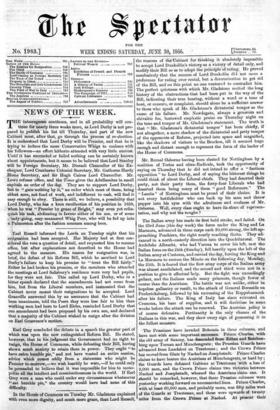In the Houle of Commons on Tuesday Mr. Gladstone explained
With even more dignity, and much more grace, than Lord Russell, the reasons of the Cabinet for thinking it absolutely impossible to accept Lord Dunkellin's victory as a victory of detail only, and modify their Bill so as to adopt the principle of rating. He proved conclusively that the success of Lord Dunkellin did not mean a preference for rating over rental, but a determination to get rid of the Bill, and on this point no one ventured to contradict him. The perfect quietness with which Mr. Gladstone recited the long history of the obstructions that had been put in the way of the Bill, indicating their true bearing, without a word or a tone of heat, or censure, or complaint, should alone be a sufficient answer to those who speak of Mr. Gladstone's dictatorial temper as the cause of his failure. Mr. Newdegate, always a generous and chivalric foe, bestowed emphatic praise on Thursday night on the tone and temper of Mr. Gladstone's statement. The truth is that "Mir. Gladstone's dictatorial temper" has been chiefly, if not altogether, a mere shadow of the dictatorial and petty temper of the opponents of Reform, projected into space and magnified, like the shadows of visitors to the Brocken, till it seemed huge enough and distant enough to represent the form of the leader of the House of Commons.






























